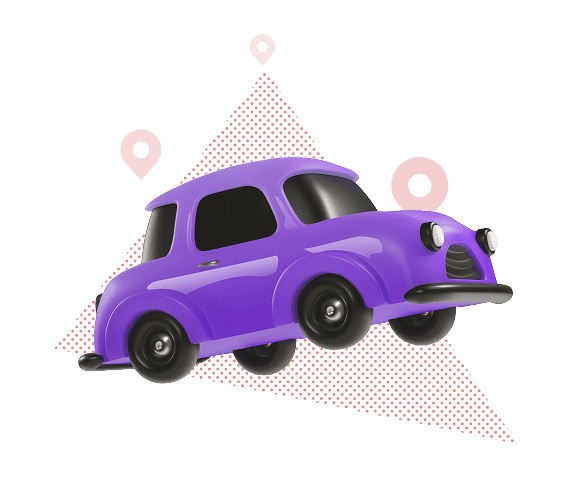Understanding Ride-hailing Insurance: Is It Necessary for You?
Updated: 25 Jul 2025
Written bySingSaver Team
Team
The information on this page is for educational and informational purposes only and should not be considered financial or investment advice. While we review and compare financial products to help you find the best options, we do not provide personalised recommendations or investment advisory services. Always do your own research or consult a licensed financial professional before making any financial decisions.
|
Saver Takeaway
|
Many drivers may not realise that personal car insurance does not cover rideshare activities, leaving them financially exposed in the event of an accident. This is where rideshare insurance — also known as private-hire insurance or commercial motor insurance — comes in.
Unlike personal car insurance, which is designed for private use, commercial motor insurance is required by the Land Transport Authority (LTA) for all private-hire vehicles (PHVs). Without the proper coverage, drivers risk financial liability for damages, medical expenses, or even legal penalties.
While some rideshare companies provide insurance, these policies often come with coverage gaps, making it essential for drivers to have their own comprehensive rideshare insurance. In this guide, we’ll cover everything you need to know about rideshare insurance, including why it’s important and what it covers.

Enhance your car insurance coverage
Not all add-ons offer the same value. Discover which car insurance add-ons provide the most benefit and how they can strengthen your protection while driving.
How important is rideshare insurance and do I need it?
If you use your car for ride-hailing or delivery services, your personal car insurance will not cover you. Most insurers exclude commercial activities from standard policies, meaning you could be left uninsured in the event of an accident.
In Singapore, the Land Transport Authority (LTA) mandates that all private-hire drivers have commercial motor insurance. Driving without the proper coverage can lead to invalid claims, fines, or even legal consequences. This is because:
-
Personal car insurance does not cover rideshare services: Standard policies are designed for personal use, not commercial activities.
-
LTA regulations require commercial insurance: All private-hire drivers must adhere to these regulations.
-
Implications of driving without the right insurance: Fines, invalidated claims, and legal risks are significant.
Who needs rideshare insurance?
-
Grab, Gojek, Ryde, TADA drivers.
-
Delivery drivers for GrabFood, Foodpanda, Deliveroo, Lalamove, etc.
-
Drivers who use their vehicles for both personal and commercial purposes.
Some of the common misconceptions include drivers assuming that ride-hailing platforms cover all incidents. This is false because platform coverage is often limited. Also, personal car insurance policies exclude commercial use.
Did you know….
In addition to rideshare insurance, you will also need a commercial car insurance policy to ensure full coverage and avoid being dropped by your carrier.
How rideshare insurance works for Grab, Gojek & TADA drivers
Rideshare insurance for platforms like Grab, Gojek, and TADA offers varying levels of coverage depending on your status in the ride-hailing process. Generally, minimal coverage is provided when the app is on, and you're waiting for a ride request. More comprehensive coverage begins once you've accepted a ride and are transporting passengers.
Here’s a breakdown of when your personal policy with rideshare coverage and the platform’s insurance would apply during a shift:
| Personal car insurance | Rideshare insurance | |
| When ridesharing app is off | ✓ | |
| When app is on and you’re waiting for a ride request | Provides limited coverage for situations like accidents or damages while waiting for a ride request. | |
| When passenger is on board | ✓ |
Each rideshare platform in Singapore has different insurance policies:
-
Grab: Provides free Personal Accident Insurance (PAI) but requires drivers to purchase their own commercial motor insurance.
-
Gojek: Requires drivers to have third-party commercial motor insurance but offers injury protection.
-
TADA: Does not provide free insurance—drivers must buy their own rideshare insurance policy.
In Singapore, damage to your car during a trip is covered by the ride-hailing platform only if your personal car insurance policy includes comprehensive and collision insurance, also known as full coverage. If you have full coverage and your vehicle is damaged while driving for Grab, TADA, or Gojek, you will need to pay the deductible, which is your portion of the repair costs, before the platform’s insurance kicks in. Each company typically requires drivers to cover a deductible before insurance coverage applies.
Did you know…
Did you know delivery insurance policies often have gaps that can leave drivers financially vulnerable? To protect yourself, consider income protection insurance to cover lost wages if you're unable to work due to an accident, and goods-in-transit insurance to safeguard the parcels you're delivering in case of damage or loss.
Rideshare insurance for delivery drivers in Singapore
If you're working with an on-demand delivery service, it's important to understand their insurance policy. Coverage varies across companies, and in many cases, it's limited.
Here's a breakdown of the insurance requirements for delivery drivers:
-
Food delivery drivers (Foodpanda & Deliveroo): These platforms provide basic third-party liability coverage, but it may not be enough for more comprehensive protection.
-
Parcel delivery drivers (Lalamove & GrabExpress): Drivers are required to have their own insurance coverage, as the platforms don’t offer insurance.
-
Motorbike riders: Motorcyclists must have a Work Injury Compensation (WIC) policy to cover any injuries that may occur while on the job.
Insurance gaps and how to address them
There are often gaps in delivery insurance policies, which can leave drivers exposed to financial risk. Here’s how you can fill these gaps:
-
Loss of income protection: If you’re unable to work due to an accident, having income protection insurance can help cover lost wages.
-
Goods-in-transit insurance: This type of insurance covers the parcels you're transporting in case they’re lost or damaged during the delivery process.
SingSaver Tips
Delivery services aren't always covered under rideshare insurance policies. When getting rideshare insurance, check to make sure your delivery service platform is covered before you hit the road with your next order.
Where to buy insurance with rideshare coverage in Singapore
In Singapore, ride-hailing drivers must have commercial insurance to ensure they are fully covered while driving for platforms like Grab, Gojek, and TADA. Commercial insurance provides the necessary coverage when you are using your vehicle for ridesharing or food delivery services. Without the right insurance, you risk facing significant out-of-pocket expenses in the event of an accident.
Here are three tips to clarify with your insurance provider when purchasing rideshare insurance:
-
Understand the coverage scope: Make sure the policy covers both passenger and driver protection while you're driving for rideshare services. This includes third-party liability and damage to your vehicle during ridesharing activities.
-
Check for comprehensive coverage: Confirm that the policy includes comprehensive and collision coverage to protect your car against damages, especially when you're carrying passengers or delivering goods.
-
Ask about additional benefits: Inquire about optional add-ons such as loss-of-income protection and goods-in-transit insurance, which may not be included in basic policies but can provide extra protection for delivery drivers.
If your current insurer doesn’t offer rideshare insurance, you can consider the following list of leading car insurance companies that do.
| Company | Contact |
| NTUC Income (Commercial Motor Insurance) | 6788 1777 |
| FWD (Private Hire Car Insurance) | 6820 8888 |
| Singlife with Aviva (Ride-Pro Insurance) | 6460 9391 |
| DirectAsia (Private Hire & Delivery Rider Insurance) | 6665 5555 |
| AXA (Private Hire Vehicle Insurance) | 1800 880 4888 |
Maximising your car rental insurance coverage
Car rental insurance doesn’t always provide full protection. Here’s what you need to know about its limitations and how to ensure you’re fully covered.
What happens if I have an accident while driving for Grab or Gojek in Singapore?
If you get into an accident while driving for a ride-hailing or delivery service like Grab or Gojek, the coverage you receive can vary depending on the company you drive for, your personal insurance, and the nature of the accident. Here’s an overview of the coverage provided by these companies in the most common scenarios:
-
If a passenger is on board: The ride-hailing platforms provide insurance coverage for the driver when a passenger is on board. This typically includes liability coverage for injuries or damage caused to others, as well as coverage for your vehicle if it’s damaged, provided your own policy includes comprehensive and collision coverage. If you’re injured during the ride, both companies may offer compensation for medical expenses, subject to the terms of their policies.
-
If the app is on but no ride has been accepted: In this situation, you are covered under a more limited insurance policy. Both platforms typically offer liability coverage for damages you cause to others, but damage to your own vehicle is generally not covered unless you have collision coverage on your personal insurance. This means that if you’re involved in an accident while waiting for a ride request, you’ll need to file a claim with your own insurance for repairs to your vehicle.
-
If the app is off: When you’re not actively using the ride-hailing app, you are no longer covered under the company’s insurance. In the event of an accident, you will have to rely solely on your personal car insurance to cover the damages, and your insurance company will determine the extent of the coverage based on your policy.
-
What happens if you’re hit by an uninsured or underinsured driver: Both companies may provide some coverage in the event you're hit by an uninsured or underinsured driver while driving for them, but the specifics depend on local regulations and the company's policies. It's important to check your personal coverage to ensure you have adequate protection, including uninsured motorist coverage, to fill any gaps in case you’re involved in such an accident.
Did you know...
For extra peace of mind, Grab drivers can purchase Partner Cover, which gives you additional coverage for medical expenses, accidental deaths, permanent disability, survivor benefits, and more if you're injured while driving on the app.
Stay ahead in everything finance
Subscribe to our newsletter and receive insightful articles, exclusive tips, and the latest financial news, delivered straight to your inbox.
About the author
SingSaver Team
At SingSaver, we make personal finance accessible with easy to understand personal finance reads, tools and money hacks that simplify all of life’s financial decisions for you.
